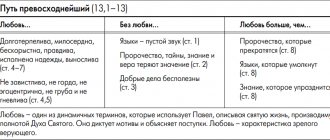The first letter to the Corinthians of St. Paul the Apostle
Share
Apostle Paul
1 Cor., 154 readings, XIII, 4 - XIV, 5.
4 Love is patient, it is kind, love does not envy, love does not exalt itself, is not proud, 5 does not act rudely, does not seek its own, is not provoked, does not think evil, 6 does not rejoice in unrighteousness, but rejoices with the truth; 7 He bears all things, believes all things, hopes all things, endures all things.
8 Love never fails, although prophecies cease, and tongues are silent, and knowledge is abolished.
9 For we know in part, and we prophesy in part; 10 But when that which is perfect has come, then that which is in part will cease.
11 When I was a child, I spoke like a child, I thought like a child, I reasoned like a child; and when he became a husband, he left behind his children.
12 Now we see through a glass darkly, but then face to face; Now I know in part, but then I will know, even as I am known.
13 And now these three remain: faith, hope, love; but love is the greatest of them all.
Chapter 14.
1 Achieve love; be zealous for spiritual gifts, especially to prophesy.
2 For he who speaks in an unknown tongue speaks not to men, but to God; because no one understands him, he speaks secrets in the spirit; 3 But whoever prophesies speaks to people for edification, admonition and comfort.
4 He who speaks in an unknown tongue edifies himself; and whoever prophesies edifies the church.
5 I desire that you all speak in tongues; but it is better that you prophesy; For he who prophesies is superior to him who speaks in tongues, unless he also speaks, so that the church may be edified.
Bishop Feoktist of Pereslavl and Uglich comments.
This passage begins with the famous hymn of love. It is so complete and perfect that it makes sense to try to learn it by heart, because love, as we know, can be interpreted in very different ways and not all interpretations will mean love in the sense that Christianity puts into it. The Apostle Paul gives a complete definition of love and, by and large, everything that does not fit into his definition is not love. Therefore, knowledge of this passage can help to conduct self-diagnosis for the presence in the soul of the highest, according to the thought of the Apostle Paul, virtue and for the fulfillment of the main, according to the thought of Christ, commandment.
The Apostle Paul calls to “pursue love” and to be zealous “for spiritual gifts, especially to prophesy.” The word “jealous” may be misunderstood by our contemporaries and therefore requires a little comment. Here it means striving for spiritual gifts more than anything else. But what is curious about the apostle’s call is this: he calls us to especially strive for the prophetic gift. Of course, by prophecy the apostle does not mean the ability to see and predict the future. The prophetic gift is the ability to understand the will of God, which, as the apostle writes in the same passage, is visible to us “as if through a glass darkly.”
Paul compares the gift of prophecy with other spiritual gifts that were revealed in the Ancient Church. Among them was the gift of understanding and the ability to speak in foreign languages. The gift is undoubtedly amazing and useful; it is capable of making a deep impression on others, just as today a person who has perfectly studied any exotic foreign language can make a splash by the very fact of knowing this language. But he who, as the apostle puts it, speaks in an unknown tongue “edifies himself,” “and he who prophesies edifies the church.” Behind this phrase, apparently, lies the meaningless boasting of those who have received the gift of speaking foreign languages. Such a person can amaze those who do not have such a gift, but at the same time only those who are either native speakers of this language or who have the same gift will be able to understand him. And prophecy as a proclamation of the will of God and as an interpretation of the Holy Scriptures can benefit many people, regardless of their preparation or the presence of certain spiritual gifts in them.
Apostle Paul: true love thinks no evil
It's no secret that thoughts largely determine our lives. How, according to the words of the Apostle Paul, can one love and not think evil, that is, not remember everything bad for one’s spouse? A thoughtful answer to this spiritual question will help save many family unions.
Continuing the theme of the main tenets of the teaching about love in the epistles of the Apostle Paul, the program “The Word” (St. Petersburg) of the Orthodox TV channel “Soyuz” again invited Archpriest Vladimir Khulap to the studio. Father Vladimir is a Doctor of Theology, Vice-Rector for Academic Affairs of the St. Petersburg Theological Academy.
«If I speak in the tongues of men and angels, but do not have love, then I am a ringing gossamer or a clanging cymbal. If I have the gift of prophecy, and know all mysteries, and have all knowledge and all faith, so that I could move mountains, but do not have love, then I am nothing.
And if I give away all my property and give my body to be burned, but do not have love, it does me no good.
Love is patient, merciful, love does not envy, love is not arrogant, is not proud, is not rude, does not seek its own, is not irritated, does not think evil, does not rejoice in unrighteousness, but rejoices with the truth; covers all things, believes all things, hopes all things, endures all things.
Love never fails, although prophecy shall cease, and tongues shall be silent, and knowledge shall be abolished” (1 Cor. 13:1-8).
– In our previous programs, we examined the 12 qualities of love that the Apostle Paul speaks about: love is long-suffering, merciful, love does not envy, does not boast... And all of them, as it turns out, are very relevant for family life.
Father Vladimir, from today we will continue to analyze chapter 13 of the First Epistle to the Christians of Corinth by the Apostle Paul. It says that love thinks no evil. What is it about?
– If you traditionally look at the Greek text of the Epistle, the verb “to think” used here is taken from the accounting field.
That is, it literally means “to scrupulously write down and record” some negative aspects.
Indeed, if we look at family life and life in general, we will understand: how a person looks at the world around him decides a lot. Thus, his whole life is determined by his thoughts.
A classic example is when a bee in a summer field sees flowers, a source of honey and nectar, and a fly sees uncleanliness in the same field. And this is a serious call to think about the role of thought in human life, and thought, including in our families and in our Christian marriages.
Christianity says that both sin and virtue begin in thought. Any thought that comes to a person's mind can be a source of temptation.
If he flirts with her, if this thought is negative, negative, and if a certain combination begins, as the Holy Fathers say, with this thought, then the person already begins to enter into some kind of internal dialogue. Then this dialogue often gains momentum, and then this thought turns into a specific matter, that is, into the matter of sin.
And the same can be said about positive thoughts.
When some negative thoughts come, we can remove them or replace them by offering something else in their place, something good, positive. This same patristic ascetic recipe is quite applicable to marriage.
Because very often spouses, perhaps without even realizing it, count only some negative moments. A day, or a week, or a month has passed, and the spouse remembers, puts only something bad in his head: you did something wrong again, you again did not act in the way I would like, you did not fulfill your promise, and so on.
And thus a completely false, one-sided image of a person is created, a negative image. And therefore, when some marital conflicts begin, dialogues blaming each other, spouses often use the words: you always do this, you always act this way, you are incorrigible, and so on.
And the person himself finds himself in a kind of trap, since such offensive things, unpleasant things are doubly or three times more unpleasant to hear from the closest person, from the one with whom I live my whole life, or wanted to at least live my whole life, with the one to whom I give all my strength and energy.
And it seems to me that children are especially sensitive in this regard. When a child is told from a young age that you are a slob, that you again did not do your homework correctly, the person gets the feeling that he is being placed in a box.
He is like some kind of experimental animal that is placed in a cage, and we ourselves create this cage for the people closest to us. And then we wonder why these people live according to the patterns that we, willingly or unwillingly, gave them as a possible scenario for their existence.
The words of the Apostle Paul, when applied to Christian marriage, encourage us to have a joyful, positive vision for our marriage. To see the best qualities in your spouse and in your children. But this does not mean that we should turn a blind eye to some problems.
This does not mean complete connivance, some kind of irresponsible attitude towards our loved ones.
When we got married, when this person and I decided to go through life together, we saw some wonderful, wonderful qualities in him, and therefore it is important to try to see these qualities now. To see my spouse with the eyes with which I saw him or her 10-15-20 years ago, when we began this joint march through life.
Some people have familial myopia, others have familial farsightedness, and this requires correction. And if we choose the right glasses, we will be able to see well.
If the lens through which we look at our neighbors is the Gospel, is Christ, then, indeed, we will always be able to see behind the shortcomings the deep core of a person who is in no way less valuable not only to me, but also to God.
And then indeed, if we are talking about the fact that we meet Christ in our neighbor, then please, in every marriage we have the opportunity to become this small church, because Christianity calls the Christian family that way - to meet Christ, to meet God through my neighbors, serving them daily.
– Next we read that love does not rejoice in untruth, but rejoices in the truth. What truth is being said here?
– It seems to me that, applying these words of the Apostle Paul to family life, first of all we are talking about truth.
A real strong, sincere family should be built on truthful relationships, and there should be no deception, no falsehood, no lies in even the smallest initial manifestations.
In the Gospel we read that he who is faithful in small things is faithful in big things, and vice versa. Accordingly, if there is this truth, if there is this trust and fidelity in some basic everyday things between spouses, then we can say that this truth, this truth will extend to all sides of this happy marriage.
After all, indeed, often some serious and incurable diagnoses of family life, leading to divorce, infidelity, or some kind of addiction of a spouse or both spouses in a marriage are caused by a small lie at an elementary initial level.
The husband told his wife that she needed to stay late at work, I had business there. But in fact, he is doing something else - at best with friends, and at worst doing something that is destroying his marriage.
The wife has no trust, jealousy begins - and this circle of mutual distrust, mutual untruth, mutual lies, mutual reproaches and so on begins.
And therefore, each spouse must start here with himself: be truthful, be honest, be sincere with the person closest to him. And indeed, this person has the right to this truth and this sincerity.
If a person agreed to live with me all his life, if he agreed to share with me all the different sides and stages of his human existence, that is, he gives me time, he gives me his whole life, then this person has the right to have me be truthful with him.
And this lie, of course, should not exist in marriage. And if we are talking about Christian marriage, then the truth for Christians is Christ, the truth for Christians is the Gospel. And therefore, this joy about the truth is not just joy about the fact that spouses live peacefully, or they have a good time together, or they have an apartment, a dacha, children go to a good school.
We find this Greek verb to rejoice - “haire” - in the Gospel very often, both in the Beatitudes and in other places, and we see that the Apostle Paul often writes to Christians: rejoice while in prison, while in prison. This joy is of a completely different quality; it does not depend on any external conditions.
We often believe that joy and happiness are achieved only when we achieve the fulfillment of some of our desires and some of our visions of what our family, our apartment, our work, our salary should look like. But this joy quickly appears and goes away just as quickly.
It’s enough to see how sometimes we rejoice, like a child, at a new toy, a new gadget, a new thing, but several days or weeks pass and we already forget about it, we want something new. And therefore, this pursuit of earthly joy, such mundane joy, will never end.
The point is that real joy is achieved only when spouses strive for the truth. Toward truth, to shared truth, to truth with God, to truth in relationships with each other.
And if such a truth exists in their marriage, or at least they strive to realize it, then such a marriage can achieve true happiness, which in no way depends on external circumstances.
In such a marriage, no matter how hard it is for the spouses, no matter what trials the Lord sends them, they rejoice. They rejoice in sorrows, they rejoice in trials, because they have found the truth, because each of them shares this truth, and this truth is not just human, but it is God-revealed.
And this truth is what is a kind of internal tuning fork of our human existence. If our soul, my soul and the soul of our family are tuned to this tuning fork of Divine truth, real joy and real family happiness comes.






